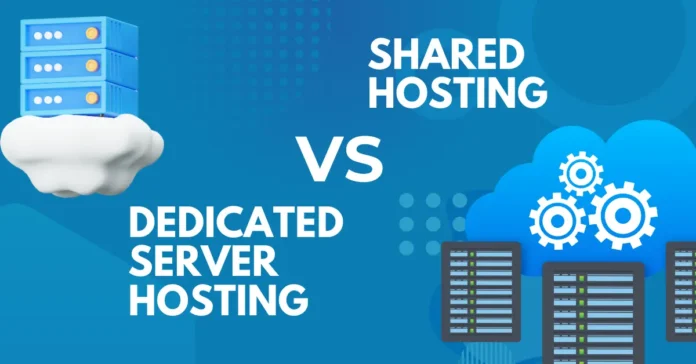In today’s digital landscape, choosing the best web hosting provider is crucial for the success of your website. With a multitude of options available, two of the most popular choices are dedicated server hosting vs shared hosting. Each has its unique advantages and disadvantages, and selecting the best one depends on your specific needs and goals. In this comprehensive guide, we’ll dive deep into dedicated server hosting and shared hosting, comparing their features, benefits, and drawbacks to help you make an informed decision.
1. Understanding Web Hosting
Before we delve into the differences between dedicated server hosting vs shared hosting, let’s first understand what web hosting is. Web hosting is a service that allows individuals and organizations to make their websites accessible on the internet. Hosting providers allocate space on a server where website files are stored, ensuring that the site is available to visitors around the clock.
2. What is Dedicated Server Hosting?
Dedicated server hosting involves renting an entire physical server exclusively for your website or applications. This means you have complete control over the server’s resources, including CPU, RAM, storage, and bandwidth. Dedicated hosting is ideal for websites with high traffic, large e-commerce sites, or applications that require significant resources.
Benefits of Dedicated Server Hosting
- Maximum Performance: Since you have the entire server to yourself, your website can operate at peak performance without interference from other sites.
- Enhanced Security: With dedicated hosting, you have more control over security configurations, reducing the risk of malware and hacking.
- Customization: You can customize the server to meet your specific needs, including choosing the operating system, software, and hardware specifications.
- Reliability: Dedicated servers offer superior uptime and reliability compared to shared hosting.
Drawbacks of Dedicated Server Hosting
- Cost: Dedicated hosting is significantly more expensive than shared hosting, making it less accessible for small businesses and individuals with limited budgets.
- Technical Expertise: Managing a dedicated server requires a higher level of technical knowledge and expertise.
3. What is Shared Hosting?
Shared hosting is a type of web hosting where multiple websites share the same physical server and its resources. Each website is allocated a certain amount of bandwidth, storage, and other resources. Shared hosting is a popular choice for small websites, blogs, and startups due to its affordability and ease of use.
Benefits of Shared Hosting
- Affordability: Shared hosting is the most cost-effective hosting option, making it ideal for small businesses and personal websites.
- Ease of Use: Hosting providers handle server management, maintenance, and updates, allowing you to focus on your website.
- Scalability: Many shared hosting plans offer the ability to upgrade resources as your website grows.
Drawbacks of Shared Hosting
- Limited Resources: Sharing resources with other websites can lead to slower performance, especially during peak traffic times.
- Security Risks: The shared environment increases the risk of security vulnerabilities, as one compromised site can potentially affect others on the same server.
- Limited Customization: Shared hosting plans often come with restrictions on the software and configurations you can use.
4. Performance Comparison
Dedicated Server Hosting
With dedicated server hosting, your website enjoys maximum performance. Since you have exclusive access to the server’s resources, there are no concerns about other websites slowing down your site. This is particularly important for high-traffic websites and resource-intensive applications.
Shared Hosting
In shared hosting, performance can vary depending on the number of websites on the server and their resource usage. During peak times, your website may experience slower load times and reduced performance due to resource contention.
5. Security Comparison
Dedicated Server Hosting
Security is a significant advantage of dedicated server hosting. With complete control over the server, you can implement advanced security measures, customize firewall settings, and install security software tailored to your needs.
Shared Hosting
In shared hosting, the security of your website is partially dependent on the actions of others on the same server. A security breach on one site can potentially affect others. Hosting providers implement security measures, but the shared environment inherently carries higher risks.
6. Cost Comparison
Dedicated Server Hosting
The primary drawback of dedicated server hosting is cost. Renting an entire server is significantly more expensive than shared hosting. This makes dedicated hosting a better fit for larger businesses or websites with substantial revenue.
Shared Hosting
Shared hosting is the most affordable option, with plans starting at just a few dollars per month. This makes it an attractive choice for small businesses, personal websites, and startups with limited budgets.
7. Customization Comparison
Dedicated Server Hosting
With dedicated hosting, you have full control over the server’s configuration. You can choose the operating system, install custom software, and configure settings to optimize performance and security for your specific needs.
Shared Hosting
Shared hosting plans typically come with limited customization options. You are restricted to the software and configurations provided by the hosting provider, which may not meet the specific requirements of your website or application.
8. Scalability Comparison
Dedicated Server Hosting
Dedicated servers offer excellent scalability. As your website grows, you can upgrade hardware, increase bandwidth, and add more resources to accommodate increased traffic and resource demands.
Shared Hosting
Shared hosting plans often include some level of scalability, such as the ability to upgrade to higher-tier plans with more resources. However, the scalability is limited compared to dedicated hosting, and there may be restrictions on resource usage.
9. Use Cases for Dedicated Server Hosting
Dedicated server hosting is ideal for:
- High-Traffic Websites: Sites with substantial traffic volumes that require consistent performance and reliability.
- E-commerce Websites: Online stores that handle a large number of transactions and need robust security and performance.
- Resource-Intensive Applications: Applications that require significant processing power, memory, and storage.
- Businesses with Specific Security Needs: Organizations that need to comply with strict security and data privacy regulations.
10. Use Cases for Shared Hosting
Shared hosting is suitable for:
- Small Websites and Blogs: Personal websites, hobby blogs, and small business sites with moderate traffic.
- Startups: New businesses looking to establish an online presence without significant upfront costs.
- Websites with Limited Resources: Sites that do not require extensive customization or high levels of security and performance.
- Test and Development Sites: Environments where developers can test and develop websites and applications before moving to a more robust hosting solution.
Conclusion
Choosing between dedicated server hosting vs shared hosting depends on your specific needs, budget, and technical expertise. Dedicated server hosting offers superior performance, security, and customization but comes at a higher cost and requires more technical know-how. Shared hosting is more affordable and user-friendly, making it ideal for smaller websites and those with limited resources.
Evaluate your website’s requirements, growth potential, and budget to determine which hosting solution is right for you. By making an informed decision, you can ensure that your website performs optimally, provides a secure environment for your users, and scales with your business needs.




